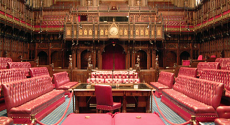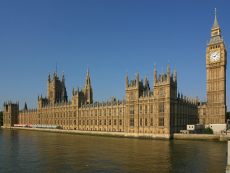
We've covered what goes on in the House of Commons, but what about the House of Lords? Unlike the Commons, the upper house of Parliament consists of 760 appointed members, meaning they are not elected by the public. This house is independent from the House of Commons, but shares the task of checking the government’s work and making and shaping the country’s laws.
So if the Lords aren’t elected, then how do they get chosen? Members of the House of Lords are called either Lords Spiritual or Lords Temporal. There are currently 26 Lords Spiritual in the House of Lords and they are appointed because of their position within the Church of England, meaning that they are normally Bishops or Archbishops. The remaining Lords are Lords Temporal and are appointed by the Queen on the advice of either the Prime Minister or the House of Lords Appointments Commission. An example would be Lord Alan Sugar, who was appointed on the advice of former Prime Minister, Gordon Brown for his business expertise.

There is a lot of controversy surrounding the Lords as despite the House of Lords Reform Act 1999, there are still 92 hereditary peers sitting in the House. This means that their title and seat in the House of Lords is passed down from generation to generation and not appointed on any kind of merit basis. Also, since most hereditary peerages cannot be inherited by women, there are currently only two female hereditary peers in the Lords – so all in all, not a very fair system! However, there have been many proposals for reform of the House of Lords and so this system is expected to change in the future, so that a seat in the House of Lords can no longer be a birth right.
In the meantime, the members of the House of Lords have an important role to play in the country’s law-making process, as well as holding the government to account and carrying out in-depth consideration of public policy. Though the Lords cannot prevent a proposed new law; referred to as a Bill until it is made into law, from being passed, they do have the power to delay it for a year, forcing the commons to reconsider their plans. Though this may be frustrating for the government, it is a crucial part of government scrutiny and ensures that all government decisions are thoroughly checked before they come into effect.
At some point a decision will have to be made about the future of the House of Lords, but for now the question remains, should tradition or progress prevail?

0 Comment:
Be the first one to comment on this article.